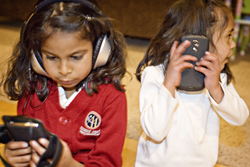Reflections of a Catholic High School Teacher
– SPD and the Prince of Peace

"Christ at 33" - by Hofmann
A few weeks ago, one of my sophomore students showed up in class wearing a rather interesting sweatshirt. I glanced up and noticed that he had placed one of the drawstrings of his hoodie into one his ears, and the other drawstring was placed into the ear of his buddy seated next to him. They were both gyrating to a barely audible thumping rhythm, empty of melody. “All right,” I sighed, holding out my hand, “Come up here and give it to Sister!” Chagrined, the young man slowly approached my desk and handed me his iPod player out of his pocket. “And the sweatshirt,” I continued, still holding out my hand. He looked aghast, “Why?” “You know why,” I responded, smirking as I stared at the tiny, black earbuds dangling from the end of the drawstrings. “All right,” he mumbled, “Sorry Sister.” A smile suddenly lit his face as he handed me the sweatshirt, “but isn’t it EXTREME SWEET? I bought it last night. See, I can plug my iPod into the pocket of my sweatshirt and listen to it through the earphones which run through the drawstrings.” “Yes,” I agreed, “that is extremely “sweet”, but not in class where it is extremely “unsweet.”
Extreme. If I hear this word one more time, I’m going to buy myself some earbuds, alright – some permanent ones! Ever notice how we live in a culture that finds fulfillment in “extreme music,” “extreme sports,” “extreme makeovers,” “extreme definition,” and even “extreme tasting chewing gum?” It’s as if we have become so saturated with noise and overwhelmed with stimuli that we have actually dulled our senses. We find ourselves constantly seeking stronger and more shocking stimuli until we can once again jolt our sluggish minds and fire our wilting neurons. Couple this with teaching teenagers who thrive off of the “extremes” in life (drama, drama, drama) and the result is extremus ad nauseum!
Devi, my three year old niece, has a condition, which doctors have labeled as, “SPD” or “Sensory Processing Disorder.” It is an inability to integrate and process the messages that signal her mind through her senses. There are different subtypes of “SPD” and the subtypes which Devi has do not involve the five traditional senses, but involve two other types of “senses” – the proprioceptive (movement) and vestibular (body awareness). Devi’s sensory deprivations force her to seek “extreme” sensory stimulation and then over-respond to them when they are too excessive. She is always seeking intense stimuli to help sooth her. Because of the lack of body-awareness and her inability to process the outside world correctly, she often puts herself in dangerous situations. For instance, she runs out in front of oncoming cars, bashes her head into the floor when she’s upset, chews on Velcro (along with other inedible objects), runs and jumps until she crashes against walls, furniture and people, and, best of all, enjoys emitting blood-curdling screams throughout the day (even when she is not in pain).  She seeks out textures that are rough, colors that are bright, and noises that are loud. However, when the loud noise or stimuli shocks her, she has another meltdown. For example, when a fire-alarm sounds at school, she is hysterical and it takes nearly three days to calm her into living a normal routine once again.
She seeks out textures that are rough, colors that are bright, and noises that are loud. However, when the loud noise or stimuli shocks her, she has another meltdown. For example, when a fire-alarm sounds at school, she is hysterical and it takes nearly three days to calm her into living a normal routine once again.
I can’t help but notice the similarity between my little niece and today’s culture as a whole. Maybe our culture is suffering from a self-induced, “sensory seeking” form of SPD? Diagnosing the problem is one thing, curing it is another. It takes a bit of determination and grit to teach Theology to students who are caught up in the race of today’s “sensory-seeking culture.” As teachers and formators of the spiritual life, we hope to inspire them with the message of the Prince of Peace. We fight to make room for Him in our classrooms and in our school liturgies. We encourage them to take Him into their homes and into their relationships. Ultimately, we long to lure their souls into His embrace. But at the end of the school day, we often sink back into our desk chairs and wonder, “Can they see Him? Can they hear Him? Can they experience Him?”
The answer is, “Yes!” Sure, it’s a challenge, but it is possible. Why? Because peace is stronger than the “extreme” of life. The gift of peace is a whisper ceaselessly calling us into the “tranquility of order” in the midst of a very noisy and chaotic world. The peace of Christ works like a “tranquilizer dart” on human disorder. We are soothed by His silent Voice and filled by the pulse of His Divine Heart. In these moments, chaos fades and the clamor of human noise halts before Divine Majesty. Our souls submit to this Heavenly medicine and hell is once again enraged.
In C.S. Lewis’ The Screwtape Letters, Toadpipe writes to his fellow demon, Wormwood, “Music and silence—how I detest them both!” Toadpipe points out that in hell there is no music or silence, only noise. “Noise,” wrote Toadpipe, “is the grand dynamism, the audible expression of all that is exultant, ruthless, and virile — Noise which alone defends us from silly qualms, despairing scruples, and impossible desires. We will make the whole universe a noise in the end.” (Lewis, XII) The whisper of peace sears through the pandemonium of life, the earthly hell we create for ourselves through our sin and our weakened human condition. This whisper of peace is propelled by a Divine force that is relentless. It pursues us with a ferocity that, once received, consumes the willing human heart in profound silence and spiritual satiation.
In the Filipino culture, there is a fine example of a forceful whisper that pierces through the sound barrier of human life. One of my Franciscan Sisters is a missionary in the Philippines. She once marveled how the Filipinos can communicate in the midst of immense confusion and clamor by simply whispering, “Psst” to their neighbor. Immediately the neighbor turns and has their attention. I actually saw this happen between two Filipinos in Rome one afternoon. I was walking down the Via del Corso, one of the busiest and most chaotic streets in Rome, when a young Filipino woman walking next to me caught sight of a friend nearly half a block away. “Psst,” she whispered, and instantly her friend turned to catch her eye and smiled.
I was stunned! Not that I didn’t believe my good Sister, but while hearing about the phenomenon is one thing, seeing it happen right in front of you is another!
What I witnessed that day was a simple whisper between friends which defied the bedlam of the Roman streets: the beep of innumerable car horns, the whirring of passing motorini, the bellowing of Pakistani side-walk peddlers, the wailing of Italian children, and the screeching of busses braking for hurried pedestrians. It was almost miraculous!
Likewise, it is a simple whisper of the Divine that miraculously defies the bedlam of our lives. In a society bombarded with confusion, information-overload, and frenzied disorder, we must repeatedly remind ourselves to listen for the whisper of the Prince of Peace amidst this onslaught of over-stimulation. At some point, the cacophony of life, along with the innumerable sins which get lost within it, drain our spirits, until overcome with exhaustion, we recognize that we must stop fleeing. We must stop – if just for a moment – to allow the peace to apprehend us, encounter our hearts and settle our souls.
Whether one is teaching in a classroom or sitting in an office next to a co-worker, we as Christians are called to help draw each person we encounter toward the Prince of Peace. How do we help convince others that it is not the much-sought-after “extremes” that will soothe our weary souls? How do we let them know that the “extremes” simply work to “rev-up” our nervous systems and increase the maddening pulse of our lives until we, like little Devi, meltdown, crash and even place ourselves in situations of spiritual danger?
In order to attract others to the gift of peace, we must begin with our own hearts. It is our primary work to first stop and submit ourselves to the Prince of Peace. Then, when we are carrying his whisper within our own hearts, we can be assured that it will pierce through the din and clamor of our “sensory-seeking culture,” and turn the heads of countless souls who long for Him.
We value your comments and encourage you to leave your thoughts below. Please share this article with others in your network. Thank you! – The Editors














